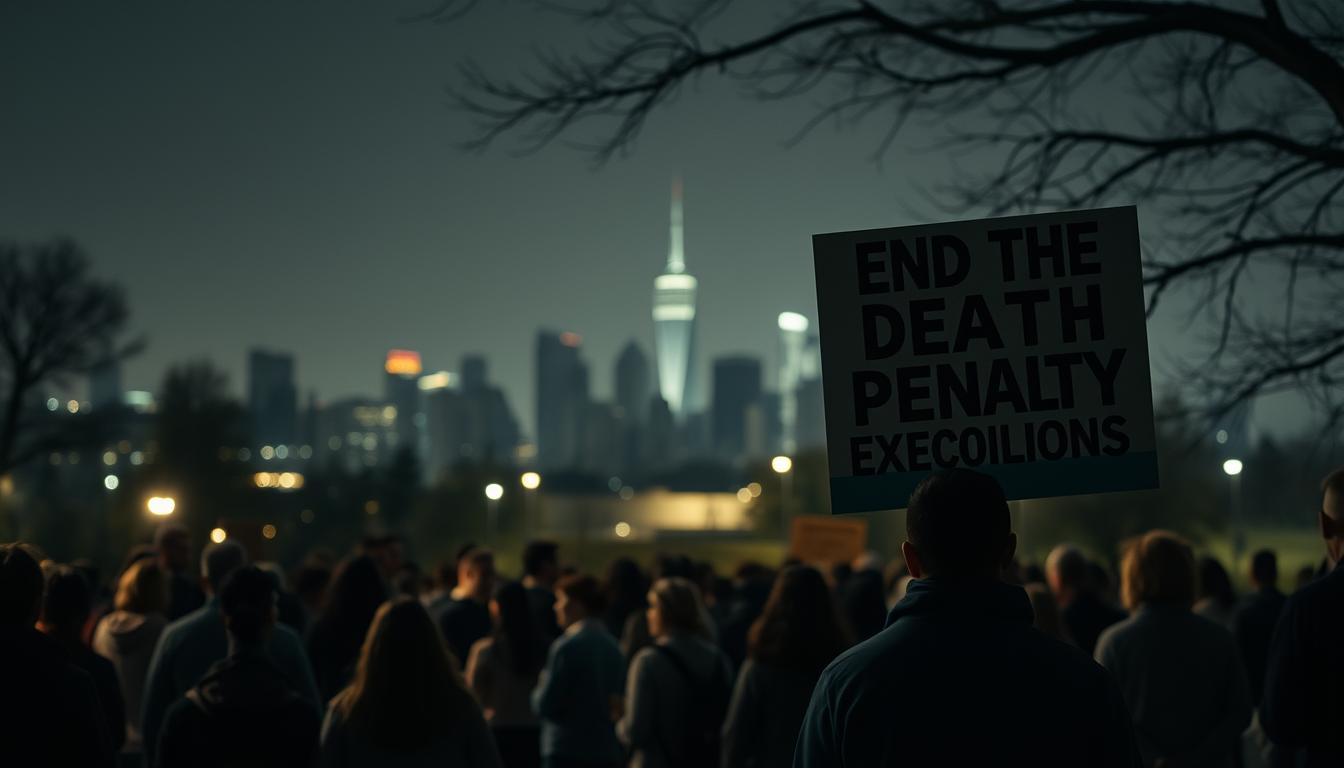
The debate surrounding capital punishment has been a contentious issue in the United States for decades, with roots tracing back to the early American colonies.
The use of capital punishment has undergone significant evolution over time, sparking intense discussions about its moral, practical, and social implications.
As we reflect on the historical context of capital punishment, it becomes clear that the time has come to reevaluate its place in modern society. Today, we will explore the Top 3 Reasons to Stop the Death Penalty.
Key Takeaways
- The death penalty has a complex and controversial history in the United States.
- The moral implications of capital punishment are a significant concern.
- Practical issues with the application of the death penalty exist.
- The social implications of capital punishment have a profound impact on communities.
- Abolishing the death penalty is a growing movement.
The Evolution of Capital Punishment in America
The evolution of the death penalty in America reflects changing societal values and legal standards. Capital punishment has been a part of the United States’ legal system since colonial times, with its roots in European practices.
Historical Context and Origins
The early history of capital punishment in America was influenced by British law, which prescribed the death penalty for a wide range of crimes. Over time, American colonies and later states began to define their capital punishment laws, leading to a diverse and sometimes inconsistent application of the death penalty across different jurisdictions.
Current Statistics on Death Row Population
As of the latest available data, there are over 2,500 individuals on death row in the United States. The demographics of this population reveal significant racial disparities, with African Americans being disproportionately represented. These statistics highlight the ongoing issues surrounding the application of capital punishment in America.
The number of executions carried out annually has fluctuated over the years, influenced by legal challenges, public opinion, and legislative changes. Understanding these trends is crucial for grasping the current state of capital punishment in the United States.
Why We Need to Stop the Death Penalty Now
The call to end the death penalty is becoming louder and more widespread. As society reexamines the practice of capital punishment, a growing abolition movement is emerging.
The Growing Movement for Abolition
Advocacy groups have been at the forefront of this movement, working tirelessly to raise awareness about the issues surrounding the death penalty. Recent legislative efforts have also been crucial, with several states reconsidering their stance on capital punishment. The role of these groups and legislative changes is pivotal in the shift towards abolition.
Recent Developments in the Debate
Public opinion is shifting, with more people questioning the efficacy and morality of the death penalty. Significant court rulings have also impacted the debate, further fueling the momentum to stop the death penalty. These developments signal a shifting landscape in the controversy surrounding capital punishment.
The movement to stop the death penalty is gaining momentum, driven by a growing consensus that abolition is a necessary step towards a more just society.
Moral Reason #1: The Ethical Problems of State-Sanctioned Killing
The practice of state-sanctioned killing through the death penalty raises profound ethical concerns that challenge the moral fabric of society. It involves the state in the act of taking a life, a decision that has far-reaching implications for the values and principles that underpin a community.
Philosophical and Religious Perspectives
From a philosophical standpoint, the debate around the death penalty often centers on the principles of justice, morality, and the role of the state. Many philosophical arguments against the death penalty are rooted in the belief that it is inherently wrong for the state to take a life, as it contradicts the fundamental principle of preserving human life.
Religious perspectives also play a significant role in shaping opinions on the death penalty. Various spiritual traditions emphasize the sanctity of life and the potential for redemption, arguing against the practice of capital punishment.
The Value of Human Life and Dignity
The value of human life and dignity is a core ethical concern in the debate over the death penalty. The act of state-sanctioned killing is seen by many as a violation of these fundamental values.
Redemption and Rehabilitation Possibilities
The possibility of redemption and rehabilitation is another critical aspect. Many argue that the death penalty precludes the possibility of an individual making amends and rehabilitating, thereby denying the inherent potential for human redemption.
Moral Reason #2: Disproportionate Impact on Vulnerable Populations
Racial and socioeconomic disparities in the application of the death penalty are stark and troubling. The death penalty disproportionately affects vulnerable populations, including racial minorities and those from lower socioeconomic backgrounds. This raises significant moral concerns about the fairness and justice of capital punishment.
Racial Disparities in Death Sentences
Studies have consistently shown that racial bias plays a significant role in who is sentenced to death. African Americans, in particular, are overrepresented on death row. This disparity is not merely a reflection of the demographics of crime but is influenced by systemic biases within the criminal justice system.
Statistical Evidence and Case Studies
Statistical analysis reveals that defendants accused of killing white victims are more likely to receive a death sentence than those charged with killing minority victims. For example, a study found that in cases involving white victims, the defendant was four times more likely to be sentenced to death. Specific case studies further illustrate these disparities, highlighting the need for reform.
Socioeconomic Factors in Capital Cases
Socioeconomic status also plays a critical role in determining who receives the death penalty. Defendants from lower socioeconomic backgrounds frequently face substantial barriers to accessing adequate legal representation. This can lead to inadequate defense and, consequently, a higher likelihood of receiving a death sentence.
Issues with Legal Representation
The quality of legal representation is crucial in capital cases. However, many defendants cannot afford competent lawyers, leading to subpar defense. Public defenders are often overworked and under-resourced, further exacerbating the issue. This highlights the need for systemic reforms to ensure fair representation for all defendants, regardless of their economic status.
Practical Reason #1: The Risk of Executing Innocent People
The irreversible nature of the death penalty makes it a uniquely perilous punishment, prone to mistakes that cannot be rectified. This is a critical concern because the justice system, despite its best efforts, is not infallible.
Documented Cases of Wrongful Convictions
There have been numerous documented cases of wrongful convictions in the United States, many of which have been overturned through DNA evidence. These cases highlight the risk of executing innocent people. For instance, the Innocence Project has documented hundreds of cases where individuals were wrongly convicted and later exonerated.
The Finality Problem: No Remedy for Mistakes
The death penalty is final and irreversible. Once an individual is executed, there is no possibility of remedying the mistake if new evidence comes to light. This finality problem is a significant concern, as it means that any errors made in the judicial process cannot be corrected.
The Impact of DNA Evidence on Exonerations
DNA evidence has played a crucial role in exonerating individuals who were wrongly convicted. According to the Innocence Project, DNA testing has led to the exoneration of over 160 individuals on death row since 1973. This highlights the potential for wrongful convictions and underscores the need for caution when applying the death penalty.
The use of DNA evidence in exonerations demonstrates that the justice system can make mistakes. It is essential to consider this risk when evaluating the use of capital punishment.
Practical Reason #2: The Extraordinary Financial Burden
Capital punishment is a costly endeavor that strains state budgets and diverts resources from other critical areas. The financial burden of the death penalty is multifaceted, involving various stages from trial to execution.
Breaking Down the Costs of Death Penalty Cases
The costs associated with death penalty cases are significantly higher than those for non-capital cases. This is due to several factors, including the lengthy and complex legal process, the need for specialized attorneys, and the costs associated with maintaining death row facilities.
- Pre-trial costs, including investigation and legal fees
- Trial costs, such as jury selection and expert witnesses
- Post-conviction costs, including appeals and habeas corpus proceedings
Comparative Analysis: Death Penalty vs. Life Imprisonment
When comparing the costs of the death penalty to life imprisonment, it becomes clear that capital punishment is the more expensive option. Studies have shown that the cost of a death penalty trial can be up to four times higher than that of a non-capital murder trial.
Budget Impact on State Justice Systems
The financial strain caused by the death penalty affects state justice systems in profound ways. Resources allocated to capital cases could otherwise be used for crime prevention, victim support services, and other law enforcement initiatives.
Practical Reason #3: Failure as a Crime Deterrent
Despite its intended purpose, the death penalty has not been proven to deter crime effectively. The debate surrounding its effectiveness as a deterrent continues, with various studies yielding mixed results.
Research and Statistics on Deterrence
Numerous studies have investigated the relationship between the death penalty and crime rates. A comprehensive analysis of these studies reveals that there is no conclusive evidence to support the notion that the death penalty deters crime more effectively than other punishments.
- A study by the National Research Council found no reliable evidence that the death penalty deters murder.
- The FBI’s Uniform Crime Reporting (UCR) Program has collected data on crime rates, which shows that states with the death penalty do not necessarily have lower murder rates.
Murder Rates in States With and Without Capital Punishment
A comparison of murder rates in states with and without capital punishment reveals little difference. For instance, a study comparing the murder rates in states with and without the death penalty found that there was no significant difference between the two.
Key findings include:
- States without the death penalty do not have higher murder rates than those with it.
- The presence of the death penalty does not appear to influence murder rates.
This evidence suggests that the death penalty is not an effective deterrent against crime, supporting the argument that it should be reconsidered.
Social Reason #1: Impact on Collective Values and Justice
Capital punishment is not just a matter of legal justice; it also profoundly impacts our collective ethical fabric. The practice of executing individuals as a form of punishment raises significant questions about the values we uphold as a society.
How Capital Punishment Shapes Societal Ethics
The death penalty influences societal ethics by normalizing the concept of state-sanctioned killing. This can lead to a desensitization of the value of human life, potentially affecting how we view and treat life in other contexts. Furthermore, it can create a culture where violence is seen as an acceptable solution to problems, undermining efforts to promote peace and rehabilitation.
Psychological Effects on Communities
The psychological impact of the death penalty on communities is multifaceted. It can cause trauma and stress among those directly related to the individuals on death row, as well as among the broader community. The anticipation and aftermath of executions can lead to a sense of unease and moral discomfort, affecting community cohesion and mental health.
Moreover, the debate surrounding capital punishment can polarize communities, creating divisions that are challenging to reconcile. By stopping the death penalty, we can begin to heal these divisions and work towards a more cohesive and compassionate society that values human life and dignity.
Social Reason #2: Global Human Rights Standards
Global human rights standards are playing a crucial role in shaping the debate around capital punishment worldwide. The death penalty is increasingly being viewed through the lens of international human rights law, which emphasizes the right to life.
International Trends Toward Abolition
There is a growing international trend towards abolishing the death penalty. Many countries have already abolished capital punishment in law or practice, reflecting a global shift towards more humane penal systems.
- More than two-thirds of countries have abolished the death penalty in law or practice.
- Regional organizations, such as the Council of Europe, have made the abolition of the death penalty a requirement for membership.
- International human rights law, including treaties like the International Covenant on Civil and Political Rights, restricts the use of the death penalty.
America’s Position in the Global Context
The United States is often viewed as an outlier among developed nations due to its continued use of the death penalty. While some states have abolished the death penalty, others continue to impose it, creating a complex legal landscape.
Human Rights Organizations’ Perspectives
Human rights organizations, such as Amnesty International, have been vocal in their opposition to the death penalty, citing its violation of fundamental human rights. These organizations advocate for the abolition of capital punishment worldwide, emphasizing the risk of executing innocent people and the disproportionate impact on vulnerable populations.
The global movement towards abolition underscores the need for the United States to reevaluate its stance on the death penalty.
Social Reason #3: The Promise of Restorative Justice
Restorative justice offers a compelling alternative to the death penalty, focusing on healing and accountability. This approach to justice prioritizes repairing the harm caused by criminal behavior rather than simply punishing the offender.
Principles and Practices of Restorative Justice
Restorative justice is built on the principles of empathy, respect, and inclusivity. It involves bringing together the victim, offender, and members of the community to address the harm caused by the crime. Practices include victim-offender mediation, family group conferencing, and community circles. These processes facilitate dialogue, understanding, and healing.
Success Stories and Outcomes
Numerous success stories demonstrate the effectiveness of restorative justice in reducing recidivism and promoting healing. For instance, programs in countries such as New Zealand and Canada have shown significant positive outcomes. By focusing on restorative justice, we can work towards a justice system that truly serves the needs of victims, offenders, and communities, ultimately contributing to a society that is more just and compassionate, and moving us closer to the goal of stopping the death penalty.
How to Take Action Against the Death Penalty
To effectively stop the death penalty, it’s crucial to engage in both policy reform and grassroots activism. Advocacy efforts can lead to significant changes in legislation and public perception.
Legislative and Policy Advocacy
Advocacy at the legislative level is vital for changing laws related to capital punishment. This involves lobbying for policy reforms and supporting lawmakers who are committed to abolishing the death penalty. By engaging with lawmakers and participating in public hearings, advocates can influence the legislative process.
Community Education and Grassroots Movements
Community education is equally important, as it raises awareness about the issues surrounding the death penalty. Grassroots movements can mobilize public opinion and create a groundswell of support for abolition. Organizing community events, distributing informational materials, and using social media can help spread the message.
By combining legislative advocacy with community education, it’s possible to create a powerful movement to stop the death penalty. Every individual can play a role in this process, whether through volunteering with advocacy groups, participating in campaigns, or simply spreading the word about the importance of this issue.
Conclusion: Moving Beyond Capital Punishment
The debate around the death penalty has highlighted significant concerns regarding its morality, effectiveness, and impact on society. As discussed, the ethical problems associated with state-sanctioned killing, the disproportionate effect on vulnerable populations, and the risk of executing innocent people are critical issues that undermine the legitimacy of capital punishment.
Practical considerations, including the extraordinary financial burden and the failure of the death penalty to deter crime, further challenge its justification. Moreover, the social implications of capital punishment, such as its impact on collective values and its inconsistency with global human rights standards, underscore the need for reform.
Moving beyond capital punishment requires sustained advocacy and community engagement. By promoting restorative justice and supporting legislative reforms, we can work towards a more just and equitable society. The journey towards abolishing the death penalty is complex, but with continued efforts, it is possible to create a criminal justice system that values human life and dignity.






